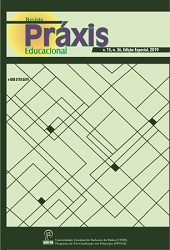THE DEVELOPMENT OF COMMUNICATIVE COMPETENCE OF UNIVERSITY STUDENTS IN THE PROCESS OF THEIR PROFESSIONAL TRAINING
DOI:
https://doi.org/10.22481/praxisedu.v15i36.5936Keywords:
communicative competence, professional training of studentsAbstract
The presented article is devoted to the development of communicative competence of students of higher educational institutions in the process of their professional training. Based on the works of such researchers as B.G. Ananiev, A.A. Bodalev, V.A. Kan-Kalik, E.D. Bozhovich, L.A. Petrovskaya, I.A. Zimnyaya, etc., the authors defined more exactly the content of the concept “communicative competence of students of a higher educational institution”, systematized its criteria and indicators (Bakholskaya, 2017; Bakholskaya, 2019; Bakholskaya, 2018; Bakholskaya, 2019; Zimnyaya, 2003). The article also presents the authors complex of pedagogical conditions, which ensure the development of communicative competence of university students in the process of their professional training. The complex includes the following components: involvement of students in an intensive educational communicative environment; creation of communicative situations on the basis of educational (professional) problems, ensuring the formation of students’ communicative competence; organization of various types of group interaction between the teacher and students, based on the application of interactive methods, techniques and technologies. The article also presents the results of experimental work, which has confirmed the effectiveness of the developed complex of pedagogical conditions, ensuring the development of students' communicative competence in the process of their professional training.
Downloads
Metrics
Downloads
Published
How to Cite
Issue
Section
License
You are free to:
Share - copy and redistribute the material in any medium or format; Adapt - remix, transform, and build from the material for any purpose, even commercially. This license is acceptable for Free Cultural Works. The licensor cannot revoke these freedoms as long as you follow the terms of the license.
Under the following terms:
Attribution - You must appropriately give credit, provide a link to the license, and indicate if any changes have been made. You may do so in any reasonable way, but not in a way that suggests that you or your use is endorsed by the licensor.
There are no additional restrictions - You cannot apply legal terms or technological measures that legally restrict others to make any use permitted by the license.










